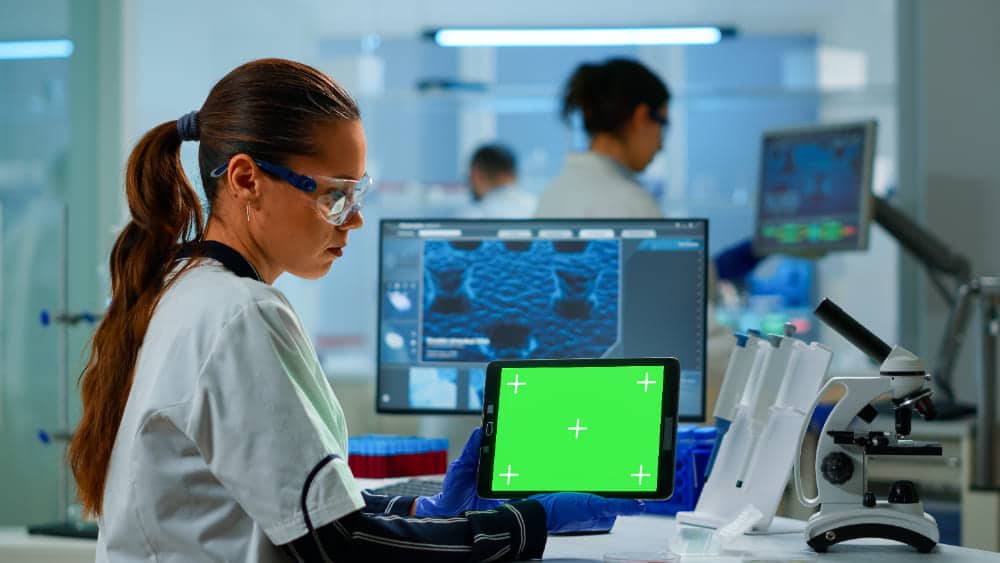Data science has transformed healthcare by discovering insights hidden in vast volumes of medical data. It predicts disease outbreaks and personalizes treatment plans, thereby empowering researchers and doctors with data-backed decision-making tools.
Technologies such as advanced analytics, machine learning, and artificial intelligence improve diagnostic accuracy, enhance patient outcomes, and maximize operations, thereby demonstrating the actual value of data science in medical diagnosis and other aspects of healthcare.
For example, the University of Kansas Health System has used predictive analysis and machine learning to identify patients who have a high risk of readmission. This way, it reduced 30-day readmission rates by 52% for patients with heart failure and 39% overall.
In Healthcare, the most prominent applications of data science are evident in genomics, drug discovery, and real-time monitoring through wearable devices. Data science connects the dots between medicine and technology, thus reshaping patient care. These truly demonstrate the importance of data science in healthcare.
Also Read: Career transitions made easy with MAHE’s MSc in Data Science
What is Data Science in Healthcare?
The role of AI and Data Science in healthcare is to enhance patient outcomes, expedite biomedical research, and optimize operations across the entire healthcare spectrum.
The most prominent components of data science applications in hospitals and the overall healthcare system may be described as below:
Data Acquisition and Processing
Data science gathers and cleans massive datasets. It gets such data from different sources and often it is fragmented, from different sources. The wearable devices, clinical imaging, and patient health records stored electronically all contribute as the data source.
Analytical Techniques
It uses scientific methods, statistical analysis, data mining, and machine learning algorithms for processing and interpreting the data.
Interdisciplinary Expertise
Data science also merges knowledge from medicine, informatics, statistics, and computer science to understand findings and apply them effectively.
Also Read: BCA in Data Science & Analytics – Career Opportunities, Salary Insights & More
Key Applications of Data Science in Healthcare
The following table enumerates the key applications of data science in medical diagnosis and other aspects of healthcare:
| Broader Area | Specific Applications |
|---|---|
| Clinical Applications | Precision Medicine Improved Diagnostics Support for Clinical Decisions Remote Monitoring of Patients |
| Research and Development | Drug Development and Discovery Genomics Clinical Trials |
| Operations and Public Health | Forecasting Disease Outbreaks Streamlined Operations in Hospitals Cost Reduction |
| Patient Engagement and Management | Improved Patient Self-Tracking Enhanced Patient Outcomes and Care |
Precision Medicine
Data science makes customized treatment plans and enhances treatment outcomes for individuals by analyzing genomic, patient, and lifestyle data.
Improved Diagnostics
Machine learning algorithms and AI detect diseases with greater accuracy by analyzing medical images like X-rays, CT scans, and MRIs.
Support for Clinical Decisions
Data science helps healthcare providers make evidence-backed decisions on treatment and patient care by providing them with data-driven tools and insights.
Remote Monitoring of Patients
Data science facilitates the prevention of complications and timely intervention through using data from devices like wearable devices and monitoring the patients’ health parameters from remote areas.
Drug Development and Discovery
Data science analyzes huge datasets and quickens the slow, high-risk, and expensive process of developing new drugs.
Genomics
Data science understands diseases and finds anomalies at the genetic level by analyzing genomic data.
Clinical Trials
Data science modernizes and optimizes clinical trials to lower expenses, enhance efficiency, and quicken the process of testing new treatments.
Forecasting Disease Outbreaks
Data science predicts potential disease outbreaks by analyzing varied datasets, which helps improve response efforts and overall public health planning.
Streamlined Operations in Hospitals
It is one of the biggest example of the use of predictive analytics in healthcare for enhanced resource management. This way, data science predicts patient admissions, equipment needs, and staffing requirements.
Cost Reduction
Data science helps in cutting costs and expenses without compromising care quality by identifying inefficient resource wastage and areas of wastage.
Improved Patient Self-Tracking
Data science offers patients insights and tools to monitor their own health data, that enables them to control their health more effectively
Enhanced Patient Outcomes and Care
The largest advantages of applying data science in medicine include more precise diagnoses, better patient condition management, and tailored treatments.
This information highlights the importance of data science applications in hospitals and the broader healthcare sector.
Read More: Are Data Science Jobs in Demand?
Benefits of Data Science in Healthcare
The table below demonstrates the benefits and importance of data science in healthcare:
| Broader Area | Specific Applications |
|---|---|
| Benefits for Patients | Personalized Medicines Better Patient Outcomes Improved Patient Engagement |
| Benefits for Healthcare Operations and Providers | Improved Diagnostic Accuracy Streamlined Operations Optimized Workflow |
| Benefits for Research and Development | Quicker Drug Discovery Progress in Medical Research |
| Benefits for the Healthcare System | Health Management of Populations Cost Reduction |
The following section describes in detail the beneficial role of AI and data science in healthcare:
Personalized Medicine
Data science yields more fruitful medical outcomes for individuals by enabling the tailoring of care and treatment plans based on their unique genetic data and medical history.
Better Patient Outcomes
Early detection tools and predictive models help in identifying high-risk patients. This allows proactive interventions that improve overall health by preventing diseases.
Improved Diagnostic Accuracy
Data science helps spot subtle patterns that indicate diseases like cancer by using machine learning and AI-driven tools to analyze patient records and medical images like X-rays, MRIs, and CT scans with more accuracy.
Streamlined Operations
Predictive analytics allow hospitals to reduce bottlenecks and allocate facilities and staff with greater efficiency by helping predict resource requirements and patient admissions.
Quicker Drug Discovery
Data science analyzes massive datasets from chemical and biological research, and in doing so, it speeds up the identification of new drug targets and potential drug candidates. This, in turn, quickens up the speed at which new medications are developed.
Progress in Medical Research
Data science assists researchers to better understand complex health issues and recognize new disease trends by integrating data from clinical trials, genomic studies, and electronic health records.
Health Management of Populations
Data science leads to improved community health results and targeted interventions by empowering healthcare organizations to analyze huge data and recognize risk factors and patterns in specific demographic groups.
An Interesting Read: Why a PGCP is the Best Way to Upskill in Data Science
Future of Data Science in Healthcare
The following list enumerates the most prominent future trends of the application of big data in healthcare analytics and other aspects of healthcare:
- Precise and Customized Medicines
- AI-Powered Treatment and Diagnostics
- Predictive Analytics to Prevent Diseases
- Improved Monitoring of Public Health
- Enhanced Accessibility and Telemedicine
- Streamlined Resource Allocation and Operations
- Faster Drug Discovery
Now, let us explore some of these future applications of predictive analytics in healthcare in more detail:
Precise and Customized Medicines
Data science will lead to safer and more effective therapies by facilitating treatments that are customized as per individual genetic profiles, environmental factors, and lifestyles.
AI-Powered Treatment and Diagnostics
Artificial intelligence will make disease diagnosis and detection quicker and more accurate by improving the analysis of medical images, patient records, and genetic information.
Predictive Analytics to Prevent Diseases
Data science models will analyze historical data to identify populations at high risk of suffering from diseases like cancer. This, in turn, will enable the implementation of proper preventive measures and early intervention.
Improved Monitoring of Public Health
Data science will enable informed policy-making and timely responses by monitoring global health trends like health disparities and disease outbreaks in real time.
Challenges and Ethical Concerns
The following are the most significant ethical concerns and challenges facing the application of big data in healthcare analytics:
- Consent and Privacy
- Data Integration and Quality
- Algorithmic Bias
- Compliance and Regulatory Issues
- Absence of Transparency and Accountability
- Integration with Current Systems
- Data Security
- Informed Consent
Now, let us explore some of these points in greater detail:
Consent and Privacy
A significant risk of using data science in healthcare is that the sensitive health data of patients could be misused or exposed without their permission or knowledge.
Data Integration and Quality
Healthcare data often tends to be fragmented, incomplete, and inconsistent, and these issues can make data science efforts complicated.
Algorithmic Bias
Algorithms can learn biases in the historical data used to train them and propagate them further. This can lead to discriminatory and biased outcomes for specific demographic groups while diagnosing them or recommending treatments.
Compliance and Regulatory Issues
The use of AI and data science in healthcare often evolves faster than existing regulatory and legal frameworks, and this can make complying with them significantly complex.
Absence of Accountability and Transparency
Many complex algorithms operate as black boxes, making it difficult to understand how they make their decisions.
Check This Out: PGCP Data Science Course Guide
Conclusion
Data science is transforming healthcare with predictive analytics, individualized treatments, operational effectiveness, and significant cost savings. The diagnostic accuracy is improving, and hospital readmissions are also reducing; this is consequently transforming the manner in which care is delivered and experienced.
Due to the progress of machine learning, AI, and big data, healthcare will be more precise, patient-focused, and preventive in the days ahead. As a professional or a student, the time is right to explore upskilling opportunities and careers in healthcare data science.
So, if you wish to take that next step, now explore specialized data science programs from the leading educational platforms like Online Manipal and become a part of the revolution that is improving lives all over the world.
You Might Also Like: Difference Between Data Science and Big Data
FAQs
1. What is the role of data science in healthcare?
Data science alters healthcare by using predictive analytics to help with early risk prediction and diagnosis, and using AI to quicken up the speed of research for discovering new drugs.
2. How does data science improve patient care and treatment outcomes?
Data science improves treatment and patient care with personalized medicines, better population health management by identifying at-risk groups requiring targeted intervention, and early disease detection by using technology like predictive analytics.
3. Can data science help in disease prediction and prevention?
Yes, data science can be of significant help in predicting and preventing diseases. It does so by analyzing heterogeneous health data to discover patterns, forecast individual risks, and predict outbreaks.
4. What are some real-world applications of data science in hospitals?
The most prevalent real-world uses of data science in hospitals are predictive analytics to avoid disease and hospital readmissions, and tailored medicines for treatments.
5. How is data science used in drug discovery and clinical research?
Data science analyzes vast datasets to determine potential drug candidates, design more efficient clinical trials, and predict safety and efficacy to quicken up the process of drug discovery.
6. Is data science in healthcare different from general data science?
Yes, healthcare data science is a domain-specific form of general data science and is directed at specific healthcare use cases and data to improve patient outcomes, aid in clinical decision-making, and optimize operations.
Become future-ready with our online M.Sc. in Data Science program













